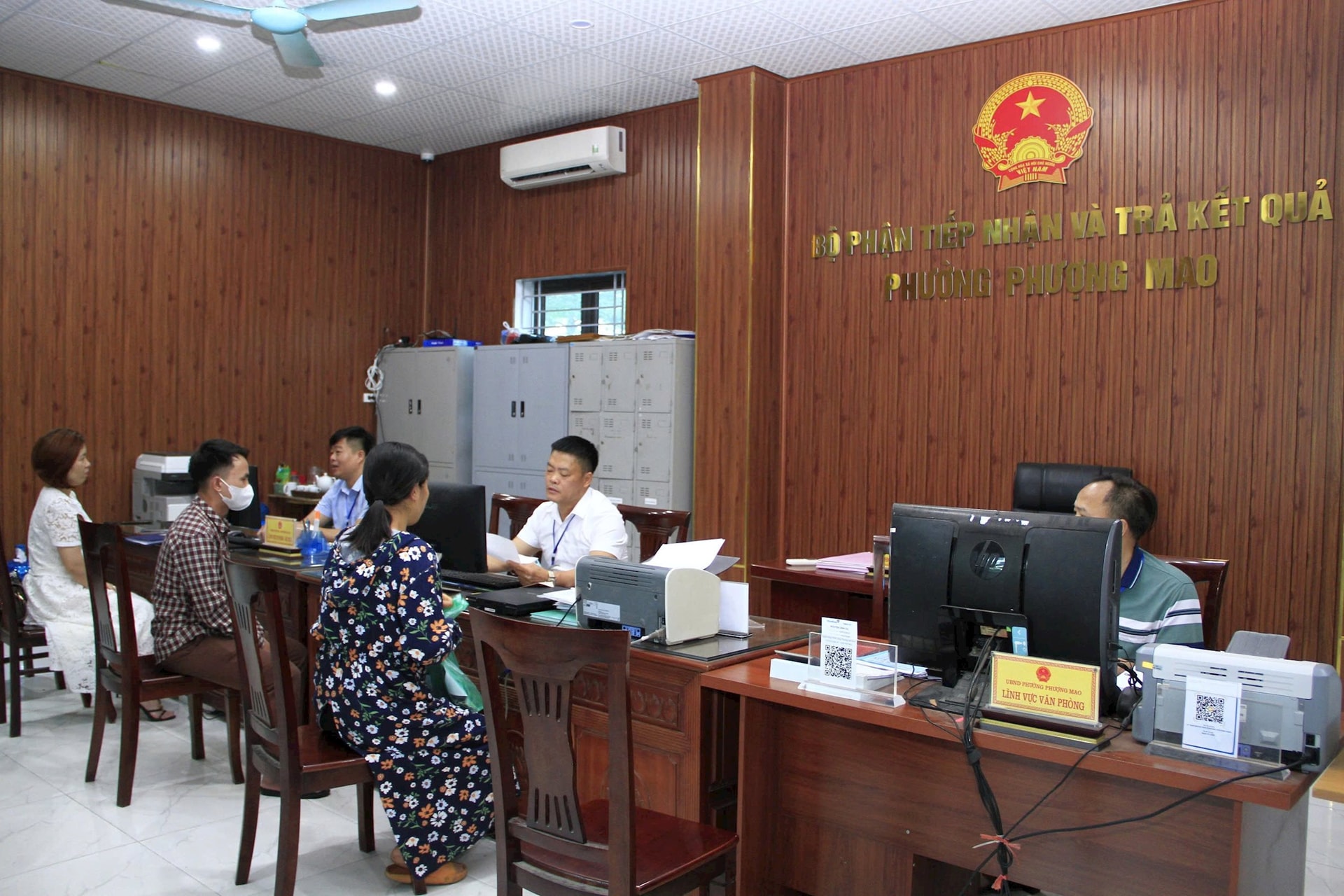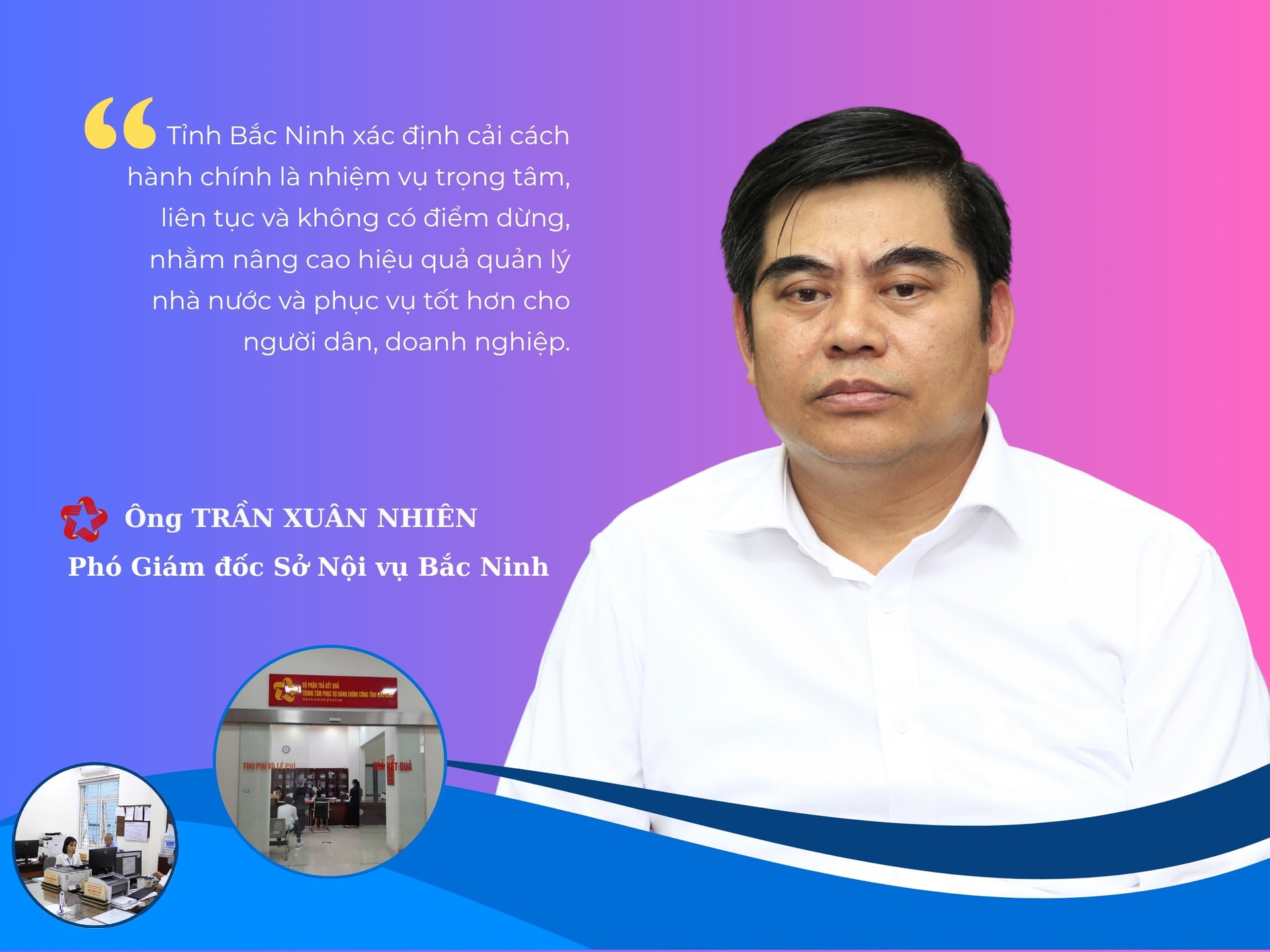Bac Ninh's relentless reform
Administrative reform has long been seen by Bac Ninh Province as a major force behind socioeconomic growth and a magnet for luring in foreign investment.
In recent years, administrative reform has received strong attention and leadership from the Bac Ninh Provincial People's Committee and heads of departments and localities. Comprehensive and determined implementation of reform measures has produced significant results, widely recognized and appreciated by businesses and citizens alike.
Digital transformation streamlines administrative procedures
According to Mr. Le Hong Phuc, Director of the Bac Ninh Department of Home Affairs, in the process of building an e-government and moving toward a digital government, Bac Ninh Province has recorded many positive outcomes from promoting digital transformation, particularly in the delivery of public services. Thanks to the application of digital technologies, many administrative procedures have been simplified, reducing costs and time for citizens and businesses, while also increasing satisfaction and trust in public administration.
 Reception and result-return section of Phuong Mao Ward, Que Vo Town. (Photo: Vu Phuong)
Reception and result-return section of Phuong Mao Ward, Que Vo Town. (Photo: Vu Phuong)
By the end of the first quarter of 2025, 100% of government agencies from the provincial to commune levels were using the Document Management System. The proportion of public services with online application submissions (fully or partially online) reached 100%, and 100% of administrative procedures were integrated with and implemented through online payment. Regarding the processing of administrative documents in the digital environment: the average rate at the provincial level reached 97.18%, the district level reached 97.91%, and the commune level reached 99.29%.
The digitization of administrative procedures not only helps reduce pressure on the government apparatus but also facilitates convenient access to services for citizens and businesses anytime, anywhere.
In addition, the application of platforms such as digital signatures, document digitization, and integrated one-stop electronic systems has streamlined internal processing and shortened procedure completion times. Some services, such as business registration, land use right certification, and construction permits, have seen processing times reduced by 30–50% compared to before. Through digitizing administrative procedures, the processing results ensure connectivity and data sharing in the electronic environment, aiming for 80% of citizens and businesses to avoid resubmitting previously recognized information and documents when carrying out administrative procedures.
.jpg) Leaders of the Bac Ninh Provincial Public Service Center discuss solutions to improve the effectiveness of the one-level Public Service Center model.
Leaders of the Bac Ninh Provincial Public Service Center discuss solutions to improve the effectiveness of the one-level Public Service Center model.
Mr. Phuc added that transparency in the processing of dossiers and the reception of feedback from citizens have also contributed to increased trust and satisfaction. According to a survey by the Bac Ninh Provincial People's Committee, in 2024, the satisfaction rate of citizens and businesses with online public services exceeded 90%, a clear indicator of the effectiveness of digital transformation. In the 2024 Public Administration Performance Index (PAPI), Bac Ninh scored 45.48 points, ranking 8th out of 63 provinces and cities nationwide. In the 2024 SIPAS Index, Bac Ninh ranked 48th with a score of 82.27%. The 2024 PAR INDEX score reached 87.96 points, placing Bac Ninh 41st out of 63 provinces and cities.
Not limited to the administrative sector, Bac Ninh is expanding digital transformation into healthcare, education, transportation, and smart urban development. The province aims to complete the digital government platform by 2025, promote the digital economy, and establish a fully integrated digital society.
On May 6, 2025, the Office of the Bac Ninh Provincial People's Committee issued Official Document No. 1859/UBND-NC, announcing the directive of the Chairman of the Provincial People's Committee regarding the implementation of administrative procedure reduction and simplification in accordance with Government Resolution No. 66/NQ-CP, as well as the delineation of authority for handling administrative procedures at the district level government.
The Chairman of the Provincial People's Committee requested that departments, agencies under the Provincial People's Committee, and the People's Committees of districts, towns, and cities urgently carry out tasks to ensure compliance with the schedule and requirements set out in Plan No. 217/KH-UBND of Bac Ninh Province. This plan implements the program for reducing and simplifying administrative procedures related to business activities in 2025 and 2026 across the province.
The focus is on completing the review, reduction, and simplification of administrative procedures related to business activities and internal administrative procedures, ensuring the abolition or proposal to competent authorities to abolish at least 30% of business conditions, reducing at least 30% of the processing time for administrative procedures, and cutting 30% of compliance costs. Continued review and implementation of decentralization, delegation, and authorization in handling administrative procedures, as well as simplification of internal administrative procedures, will be carried out in line with the implementation of the two-level local government model.
Provide 100% of online public services at all three levels under the management functions of the unit on the National Public Service Portal, ensuring smooth, continuous, and efficient operation while minimizing paperwork. The deadline for completion is June 1, 2025. Urgently implement administrative procedures that are not dependent on administrative boundaries at the provincial level.
Implement matters related to the termination of district-level local government operations and the organization of the two-level local government system. The reception and resolution of administrative procedures for citizens and businesses must be ensured to remain stable, continuous, smooth, and effective without interruption, in accordance with the directive of the Chairman of the Provincial People's Committee in Official Document No. 832/UBND-NC regarding the implementation of Official Document No. 219/TTg-KSTT issued by the Prime Minister on administrative procedures for citizens and businesses during organizational restructuring and streamlining.
With the clear objectives outlined above, businesses can be assured that the government is always alongside them, supporting their efforts and minimizing the time needed for processing documents, Mr. Phuc shared.
Administrative reform contributes to improving the business environment
This was shared by Mr. Tran Xuan Nhien, Deputy Director of the Bac Ninh Department of Home Affairs, at the Business Forum Magazine. Mr. Nhien stated that Bac Ninh’s administrative reform efforts have seen many positive changes and achieved important results, contributing to the improvement of the business environment and increasing satisfaction levels among citizens and society towards the government apparatus at all levels.

The province’s administrative reform efforts have received strong and determined attention from the entire political system, from the provincial level down to the grassroots. A wide range of flexible, bold, and innovative solutions has been implemented. Leaders of departments and localities have taken an active and proactive role in promoting administrative reform, while also enhancing the accountability of agency heads in driving these efforts.
Based on directives from the central government and the province, agencies, units, and localities across Bac Ninh have proactively developed plans and issued implementation documents, focusing on accelerating administrative procedure reform and improving service efficiency for citizens and organizations. They have also conducted reviews, reorganized, and streamlined their departments and units, achieving many positive outcomes.
The results of Bac Ninh Province’s administrative reform efforts in the first quarter of 2025 are as follows: The Provincial People’s Committee directed departments and localities to strengthen inspection and supervision of task performance, public duties, administrative discipline and order, and the code of conduct in interactions with citizens across the province.
On institutional reform: In an effort to address legal obstacles for production and business activities, the quality of Bac Ninh Province’s legal normative documents (LNDs) saw significant improvement in the first quarter of 2025. The Provincial People’s Committee issued 10 LNDs and reviewed another 10.
On administrative procedure reform: In the first quarter of 2025, the Chairman of the Bac Ninh Provincial People's Committee issued 36 decisions announcing administrative procedure lists, based on the published decisions of relevant ministries and agencies. These focused mainly on standardized procedures and adjustments to the implementing agencies, in line with the restructuring and streamlining of specialized agencies under the Provincial and District-level People's Committees.
Administrative procedure resolution: The rate of online applications at the provincial level reached 99.91%, district level 100%, commune level 99.90%; 750/617 feedback and complaints were resolved (reaching a rate of 82.3%). The average satisfaction level reached 3.14 points, in which the People's Committee of Que Vo town achieved the highest satisfaction (5 points); the People's Committee of Yen Phong district recorded the lowest public satisfaction (2.3 points),..
On organizational apparatus reform: In recent times, Bac Ninh Province has focused intensely on restructuring its organizational apparatus in accordance with Resolution No. 18-NQ/TW, following the direction of being “Streamlined – Compact – Strong – Efficient – Effective – High-performing.” As of March 1, 2025, the province completed the plan to reorganize administrative agencies and public service units across the province. To date, 172 organizational units have been reduced.
 Carrying out administrative procedures at Dong Ngan Ward, Tu Son City (Photo: Vu Phuong)
Carrying out administrative procedures at Dong Ngan Ward, Tu Son City (Photo: Vu Phuong)
Mr. Nhien stated that 100% of departments and sectors have completed the reorganization of their specialized offices to meet the criteria set by the Government. The total number of public service units in the province is 496 agencies and units (a 20.4% decrease compared to 2015); The total number of civil servant staff as of December 31, 2024, is 1,399 (a 12.24% decrease compared to 2015); The number of employees receiving salaries from the state budget at public service units as of December 31, 2024, is 22,163 (a 16.35% decrease compared to 2015).
In 2024, the Chairman of Bac Ninh Provincial People’s Committee presided over two dialogue conferences: “Ready procedures – Successful projects” and the program “Sharing information – Growing together with businesses”.
Bac Ninh Province has concretized this through directive documents to help improve the institutional framework for implementing the Regulation on receiving and handling feedback and recommendations via the Feedback and Recommendations application.
Fully publicizing the procedures, forms, and processing progress of administrative procedures on Bac Ninh Provincial Public Service Portal; currently implementing 100% digitalization of FDI – Supporting Industry files, integrating automatic alerts for overdue processing progress on the Public Service Portal, and deploying a CRM system to receive online feedback that allows businesses to rate satisfaction and provide comments directly on the One-stop Portal.
In the next phase, the province will consider expanding the scope of the “one-stop” mechanism to the logistics sector, dry ports, and electricity services, while also linking with neighboring regions to maximize convenience for businesses, and develop a project on “Investment policy stability”.
Mr. Nhien affirmed that many good initiatives, models, and new solutions in administrative reform have been implemented and applied effectively, such as restructuring and simplifying dossier components; streamlining administrative procedure processes; developing interactive electronic forms; and innovating the use of digital technology in the provincial leadership’s citizen reception activities, among others.
Through this, it contributes step by step to building Bac Ninh’s provincial administration increasingly modern, professional, disciplined, transparent, effective, and efficient; putting citizens and businesses at the center; and using the satisfaction of people and organizations as the measure to evaluate the service quality and management quality of state administrative agencies from the provincial to the grassroots level.








